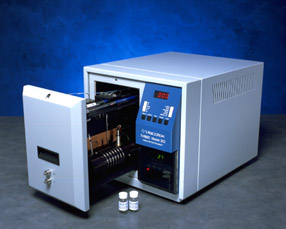Sep 16 2008
Viscotek has released an application note that describes a new light scattering technique that could be very helpful in Gel Permeation Chromatography (GPC) applications where the demands of sample solvent and mobile phase are different.

Solvent enhanced light scattering (SELS) in combination with Gel Permeation Chromatography (GPC) allows users-with two different solvents-to separately optimise the sample preparation step and the chromatographic conditions to increase the dn/dc value to get better light scattering responses.
In the application note an example of a fluoropolymer analysis by SELS-GPC is shown. Although the fluoropolymer is quite soluble in Tetrahydofuran (THF) the dn/dc in this solvent is very low and the light scattering response poor. Whilst using a low refractive index solvent like Acetone increases dn/dc the sample is not soluble in Acetone. But by dissolving the sample in THF and injecting the solution into a mobile phase of Acetone (SELS concept) the researchers were able to maximise the accuracy and reliability of the GPC-LS analysis while using a cheap and safe solvent as mobile phase.
Viscotek - a Malvern Instruments Group company is the global leader in Gel Permeation Chromatography (GPC) / Size Exclusion Chromatography (SEC) detectors, software and systems for the characterisation of natural and synthetic polymers, copolymers, proteins, protein conjugates and nanoparticulate materials. Viscotek's innovative products and technologies are backed in Europe, North America and Asia by superior technical service and analytical support.